- Home
- Skye Warren
Sonata
Sonata Read online
SONATA
Skye Warren
Who is Samantha Brooks without her violin? Fear lives in the silent spaces. Love does, too. There’s a battle being waged in her heart, and Liam North is determined to win. He’ll use every weapon in his arsenal. His body. His heart. Except the spotlight puts her in the crosshairs of dangerous men.
Samantha fights to compose her own ending, even as the final notes rise to a heartbreaking crescendo.
SONATA is the third and final book in the explosive trilogy with Samantha Brooks and Liam North. It should be read after OVERTURE and CONCERTO.
Table of Contents
Cover
Title Page
About the Book
Chapter One
Chapter Two
Chapter Three
Chapter Four
Chapter Five
Chapter Six
Chapter Seven
Chapter Eight
Chapter Nine
Chapter Ten
Chapter Eleven
Chapter Twelve
Chapter Thirteen
Chapter Fourteen
Chapter Fifteen
Chapter Sixteen
Chapter Seventeen
Chapter Eighteen
Chapter Nineteen
Chapter Twenty
Chapter Twenty-One
Chapter Twenty-Two
Excerpt from Diamond in the Rough
Books by Skye Warren
About the Author
Copyright
CHAPTER ONE
“The music is not in the notes, but in the silence between.” – Wolfgang Amadeus Mozart
Samantha
The scent of ripe orange mixes with brine. Pungent fresh flowers sharpen the calming pile of handmade lavender soap. Farmers and fishermen fill the stalls as the dawn’s light turns from pale to yellow. I stroll through the market, my canvas bag heavy with peaches.
In one stall a man works rope into braids through his gnarled fingers. Rugs and baskets line the stall. Shells form designs through the hemp. A row of sand dollars and starfish line the wood countertop. I pick up a large conch shell and put it to my ear. Ocean sounds shimmer from the space. It’s the only music I’ve had since we came here to hide. It feels like a Band-Aid on a gaping wound—not nearly enough to staunch the bleeding.
“Ten euros,” the man says in a heavy accent.
It’s more than a good price. It’s low. If we were a few miles south, with the touristy hotels and casinos, it would go for five times that much. I set the shell back down on the scarred wood. It’s not the price that stops me, but the possession. I can keep it in the flat, but then what? Should I cart it around in my suitcase if we move once again? I’ve been reduced to a nomadic existence, the same as my childhood.
“You came back,” the woman at the baker’s stall says in French. I’m learning bits and pieces. Enough to stumble my way through a purchase, almost definitely paying more than I should.
On the other hand, living among people who speak a foreign language makes me appreciate the words we say with our bodies, our hands, our eyes. The urgency of desperation, the casual cruelty of indifference. Every glance tells a story. The baker’s, with her knowing eyes, speaks of a port in the storm. Rest here, where you’re not in danger, even if you’re not among friends.
“How long are you here?” she asks.
My mind works through the words. Mastery in music is supposed to make learning languages easy, but that’s never been true for me. Language has too many secrets. It’s more about obscuring than sharing. With music there’s no place to hide, assuming you even wanted to. That’s the magic of it. It’s also the dark side. People reveal more than they know.
“A few weeks,” I say, reciting my story in broken French. A small grimace. “As long as I can before my dad cuts off my credit card. I don’t want to tell him about flunking Organic Biology.”
She nods, full of conspiratorial approval. The town outside Nantes is too small to blend in. So we don’t bother trying. Instead I fulfill the stereotype of the American girl from a wealthy family, following her dreams for a foolhardy summer before I return to settle down to a life of eco-SUVs and tennis shorts. My terrible French suits the role perfectly.
Baguettes and loaves pile on top of each other in an elegant sprawl. A tin cake stand features a few pastries. It feels decadent to even admire them. Strawberry and basil scones. Chocolate chili pepper tart. My stomach tightens into a knot. I point to a plain baguette. It will go with plain eggs and plain yogurt. It suits the plain walls of our rented flat.
“Deux,” I say, pulling euros from my pocket.
She makes change efficiently, and I grasp the crust with my bare hands, stacking them in my canvas bag. I wave my thanks and lick the crumbs from my fingertips. There’s no wax paper or rolls of plastic bags like in a regular grocery store. Everything here is drenched in sunshine. It might be the eighteenth century, the lanes only wide enough for a horse and buggy, the cobblestones uneven beneath my sandals. A market has been here every Sunday for centuries. Only the stand at the end, with its secondhand iPhones and bootleg Fortnite CDs, proves we’re still in modern times.
I break from the crowd, turning towards home. A shadow follows mine.
It’s only there for a heartbeat. I might have imagined it. Then the sun outlines my head and shoulders as if I’m truly alone. I’m not. My pulse beats a warning drum. I pull the bag close to me and speed up, keeping my head down. Three steps. Four. Five.
Around a corner. I break into a run, the bag slamming against my hip, the peaches bruised beneath the canvas. I take a different way home every time I visit the market. Terrible lessons. They keep me alive.
This way pulls me through a narrow alley with clotheslines hanging faded sheets. My flying leg knock against a box that starts to emit the mew of kittens and the hiss of their mama. It’s almost enough to make me stop. They probably know better how to survive in this world than I do.
My lungs burn, but I run faster than before—determined. For what reason, I don’t know. I’m less sure as the days go on, less certain of anything. Not even music can save me.
When I reach Rue des Coquilles I slow to a casual walk, forcing myself not to breathe hard and give myself away. Nameless faces bustle past me. That’s what I’ve become: nameless. I tuck my head against my chin, warding off the cold. There’s only a pleasant breeze on the sea-swept air. The chill comes from inside me.
That’s how I enter the small house that serves as our temporary jail. I smell her acidic orange perfume before I see her. Madame Tissot appears at the bottom of the staircase as if she’s been waiting for me. Maybe she has.
“You’re leaking,” she says by way of greeting.
I glance down, where an egg yolk dangles obscenely from the corner of my tote bag. “Shoot. I’d better take this upstairs.”
Madame Tissot isn’t French by birth. She grew up in Colorado before she fell in love with a Mr. Tissot, who brought her here before he inconveniently died in a car crash while visiting his whore. Her words. Not mine. She does not seem inclined to let me pass. “Did you get hit by a bike?”
It’s the way Mr. Tissot went. A small swipe from the handle of a motorbike in a too-narrow lane. He spun around only to slam his head into the concrete ground. “No, but I should get upstairs and salvage what’s left of the groceries.”
She doesn’t move. Liam would never get caught in a conversion he didn’t want. He managed to rent the apartment while sharing absolutely nothing about himself.
Meanwhile I get trapped every time I walk out the door.
Madame Tissot leans close enough that I smell her stale coffee from this morning. “You don’t need to bother with groceries. Meals are included in your rent.”
The weekly paym
ent barely covers the two-bedroom apartment, much less food. I realized why the first morning I went down for breakfast. Sitting at the dining table meant talking. It’s Madame Tissot’s sad little social circle. I feel bad for her, lonely in this leftover house, but not enough to go back.
I make a vague gesture. “Oh, you know. It’s no trouble.”
Realization dawns on her face. “And you probably want privacy.”
“It’s not like that,” I say, too quickly. Because it is like that. We need privacy for hiding and planning. Not for sex, the way the twinkle in her eyes implied. “We aren’t together.”
She frowns, and belatedly I realize I’m supposed to be a college student on a break. “He’s… my father,” I mutter. “He’s kind of pissed at me, but we’re working it out.”
“Ahhh, I see.” The lights in her dark eyes shift, showing a decided feminine interest in the handsome, brooding tenant who’s no longer taken. “He does not understand your wish for independence?”
I don’t know why it feels so strange to pretend Liam’s my father. It fits the cover story—and has the added benefit of being mostly true. That’s all we are right now. All we’ll ever be. The fact that I thought we’d be more… “No, he doesn’t understand.”
“You’re throwing away your future,” she says on a fake male voice. “You don’t know enough about the world to make these decisions. I know what’s best for you.”
“Exactly,” I say, surprised that the complaints of a father with an errant sorority girl so closely match my real situation. Apparently being a violin prodigy does not spare me the ordinary problems. The thought brings me a strange comfort. I’ve always wanted to be normal.
“Of course, the irony. How can you learn about the world unless you fail?”
My heart stops at the word fail. Is that what I’ve done? There’s no F on my transcript. No incomplete coursework sitting at some university, the way she thinks. Instead there’s a global tour deserted. A career as a professional violinist—abandoned.
I mumble some incoherent goodbye before starting up the stairs. They creak and moan, announcing my arrival to the man on the other side. The one who followed me home.
Right after the shooting in New York City, I was more worried about the bullet in Liam’s lung. We were worried about making sure we weren’t followed, that we retreated deep enough to be safe. It was only later that I realized Liam’s angry with me. No, that’s not the right word. He’s furious with me. A soul-deep rage that I can’t understand or breach. I’ve never seen his anger before, not really. I wasn’t the kind of teenager to stay out past curfew or spend too much at the mall. Even if I had, he’d been too stoic to let much show. This is different. It simmers near the surface whenever we’re in the same room, scalding me without a single touch.
Liam
The roof is occupied. I waited fifteen minutes after Samantha left for the market before climbing the fire escape. Josh North leans against a hollow metal air vent, black sunglasses blocking his eyes, so like my own. “Fancy meeting you here,” he says.
My chest feels tight—surprise, relief, guilt. Seeing one of my brothers has the predictable reaction. Feelings that I’d rather not feel. I give him a curt nod and leap to the next rooftop, landing soft on my feet even though it makes my side ache.
Air brushes my side. Josh lands beside me, soundless. “Should you be doing that?”
“Probably not.”
We continue moving over the rooftops, separating once around the steeple of a medieval church. Our movements are careful enough that we could be on a mission together. It’s natural to treat it that way. We lived under threat long before we enlisted.
I stop at the building beside the marketplace. A hundred people mill between stalls. The air is filled with shouts from farmers and fishermen. Down the alleyway boys play soccer on the cobblestone. Samantha bargains at a fruit stand, looking fresh and pure in a white lace top and flowing beige skirt.
Only when I see her can I breathe again. “Why are you here?” I ask the question without turning. I can feel his presence beside me. Of course he would have found me. It isn’t an accident that I brought Samantha here to recover. Russia is where our story began, but France—this is where we’ll end.
“I found the file you wanted.”
That makes me look at him. “You were supposed to use the drop box. Fine. What did it say?”
“It’s empty. Almost empty. A few pages of useless bullshit.”
“Christ.” That means the corruption in the US government goes higher than we suspected. Most of our missions were classified. We know the dark side of politics. The foreign leader who dies of natural causes in another country. The militia with leaking intelligence. That was our job before we left service and started North Security.
Samantha’s father was a diplomat. His records would have the highest clearance, but Josh is owed enough favors from the people in the State Department to get it.
Information might be redacted or blacked out, but if it’s missing entirely? That means someone at a very high level has tampered with official documents.
That means treason.
Josh crouches low on the rooftop, running his hands through a smattering of pebbles and detritus on the edge. Three indents mark the soft concrete underneath. He gives a low laugh. “You scoped out a five-mile radius, didn’t you? Paranoid motherfucker.”
“It doesn’t matter. We can’t stay here forever.”
“Can’t you? Maybe you can buy a little cottage on the beach. She can weave baskets while you do whatever the fuck it is that men do around here. Get a boat. Fish.”
“Samantha is a violinist.”
“She hasn’t played in weeks. Maybe—”
“Samantha is a violinist.”
He looks away. I know he doesn’t agree with the way I handle her. That makes us even. I don’t agree with the way he handles a goddamn thing. “Whether she plays again or not, you don’t need to follow her around. You definitely don’t need to jump in front of another goddamn bullet.”
“Then we’d better make sure there isn’t another one.” Because there’s no way I’d ever let one touch her pale, soft skin. There are things I won’t do when it comes to her. Leave her. I won’t leave her. I’m feeling the sand run through my fingers. We’re running out of time.
CHAPTER TWO
A study examined the deaths of artists and determined that a musician’s lifespan averages 25 years shorter than the general U.S. population.
Liam
I force myself to study the communication report, but stars blink in front of my eyes. Pain. Low blood pressure. Lack of oxygen. I catalog the physical responses without indulging in emotion. I’ve taken bullets before, but never one that tore this particular path through vital organs. Three months later, and I can barely manage to stand for an hour at a time.
Creaks on the stairs bring Samantha closer. It used to be a kind of peace, having her nearby, listening to her play in the room next to my office. The only peace I’d ever found. Now it’s gone. Her approach spikes my heartbeat. Resentment ripples inside me. I have to force it back, behind a bland façade.
She opens the door, her expression determinedly cheerful. “There you are. I’m going to make sunny side up this morning. And there’s some fresh baguettes to dip the yolk.”
Sunshine. That’s what she looks like. Bright enough to blind me.
I glance down at the yolk in question, which bobs precariously near the floor. Even if there are unharmed eggs in the bag, I’ll probably be served that specific one, replete with dirt and shell, as punishment for making her run. I have to know, though. Have to know that she can spot a tail and lose it.
Or maybe I’m punishing her for choosing this life. The running. The hiding. This is what she picked instead of being in the goddamn spotlight. For you, a low voice murmurs. It sounds like my father. She gave it up to keep me safe, the tour canceled, tickets refunded by the time I could stand. I’m the reason she no longer h
as a bright future, and it’s killing me worse than that bullet.
“I already ate,” I say, pushing my gaze back to the report. It took the Red Team two weeks to put this intel together, and I can’t even focus on it.
A sharp intake of breath as she sees the tray, complete with an omelet and orange juice and sprigs of fresh lavender. “How did you get Madame Tissot to agree to this?”
“I didn’t.” It was the cook I bribed. First with money. Then, when the cook deduced my skillset and arsenal from the maid, she asked for a different payment. Her sister’s husband used his fist to do the talking. And so one night, while Samantha slept in the little twin bed with lace-trimmed sheets, I climbed onto the roof and walked the city. A single bullet.
That’s all it takes to end a life.
Part of me wants to tell Samantha. The perverse part of me.
That’s who you gave up your career for—someone with blood on his hands. A murderer. I killed someone for a goddamn omelet. So that you could have breakfast sent up. And you know what? I’m not even sorry. I’d do it again. Do you want dinner, too? Surely there’s some other sorry soul who needs to sleep.
Except if I do that, she’ll look at me with horror in her soulful eyes.
I’m not ready for that.
She turns to the sink at the small countertop, carefully emptying the bag and rinsing her purchases. Soaking the bottom of the tote bag to clean the egg away. It’s startingly domestic, her bare feet on the laminate, the stream of water running over her fingers.
I stand to join her and I’m aware of a warm trickle down my side. The wound must have opened. It probably happened on that last jump between buildings. My breath catches. Barely a movement of molecules in the air. She hears it, of course.
Her dark eyes flash with something like anger. It reminds me that I’m not the only one pissed off about this situation. Neither of us knows where to put these feelings. She’s the obedient one, the good girl. I’m the one full of restraint and ignoble desires. Who are we if not those old people? Both of us locked in four hundred square feet, a prison of our own making.

 Leashed
Leashed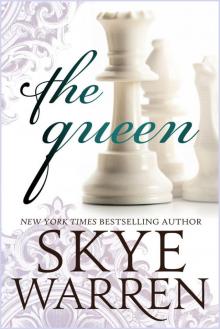 The Queen
The Queen Hear Me
Hear Me Below the Belt
Below the Belt Pretty When You Cry
Pretty When You Cry Hold You Against Me
Hold You Against Me Beneath the Beauty
Beneath the Beauty Love the Way You Lie
Love the Way You Lie Dark Nights Boxed Set: The Complete Series
Dark Nights Boxed Set: The Complete Series The Prince
The Prince Deep
Deep Caught for Christmas
Caught for Christmas Wanderlust
Wanderlust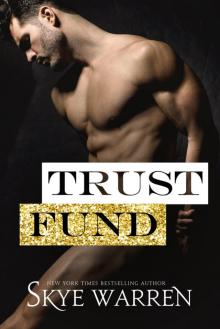 Trust Fund
Trust Fund On the Way Home
On the Way Home His for Christmas
His for Christmas Mating Theory
Mating Theory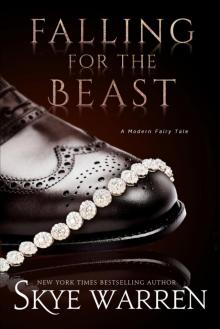 Falling for the Beast
Falling for the Beast Escort
Escort Take the Heat
Take the Heat Strict Confidence
Strict Confidence Sonata
Sonata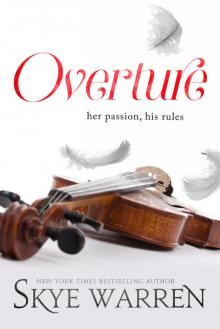 Overture
Overture Broken Beauty
Broken Beauty![[2018] Escort Read online](http://i1.bookreadfree.com/27/2018_escort_preview.jpg) [2018] Escort
[2018] Escort Beauty Touched the Beast
Beauty Touched the Beast Survival of the Richest
Survival of the Richest Secret
Secret Audition
Audition Rough Hard Fierce, Chicago Underground 1-3 (Rough Hard Fierce)
Rough Hard Fierce, Chicago Underground 1-3 (Rough Hard Fierce) Best Kept Secret
Best Kept Secret The Bishop: A Tanglewood Novella
The Bishop: A Tanglewood Novella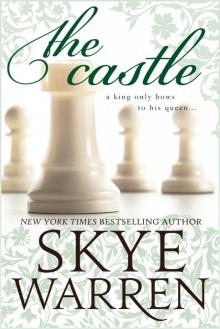 The Castle
The Castle Loving the Beast
Loving the Beast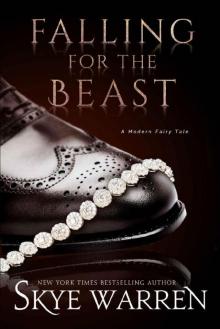 Falling for the Beast (A Modern Fairy Tale Duet Book 2)
Falling for the Beast (A Modern Fairy Tale Duet Book 2) Hidden Gem
Hidden Gem The Pawn and the Knight
The Pawn and the Knight![[2018] Survival of the Richest Read online](http://i1.bookreadfree.com/10/2018_survival_of_the_richest_preview.jpg) [2018] Survival of the Richest
[2018] Survival of the Richest Wild
Wild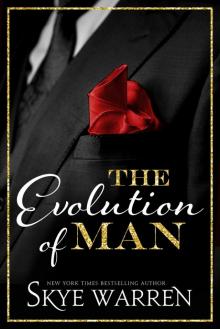 The Evolution of Man
The Evolution of Man Beauty Becomes You
Beauty Becomes You Even Better
Even Better Anti Hero
Anti Hero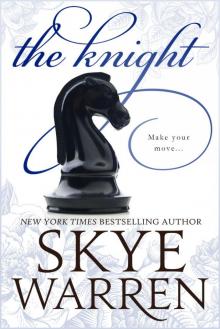 The Knight
The Knight Dirty
Dirty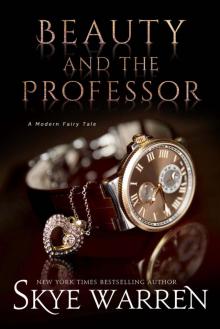 Beauty and the Professor
Beauty and the Professor To the Ends of the Earth
To the Ends of the Earth Sweet
Sweet Better When It Hurts
Better When It Hurts Prisoner
Prisoner Silver Lining
Silver Lining Take the Heat: A Criminal Romance Anthology
Take the Heat: A Criminal Romance Anthology To the Ends of the Earth (Stripped #5)
To the Ends of the Earth (Stripped #5) Diamond in the Rough
Diamond in the Rough Rough Hard Fierce
Rough Hard Fierce Hear Me (Dark Erotica)
Hear Me (Dark Erotica) Even Better (Stripped #2.5)
Even Better (Stripped #2.5) We Wish You A Naughty Christmas: A Christmas Collection
We Wish You A Naughty Christmas: A Christmas Collection Hold You Against Me: A Stripped Standalone
Hold You Against Me: A Stripped Standalone